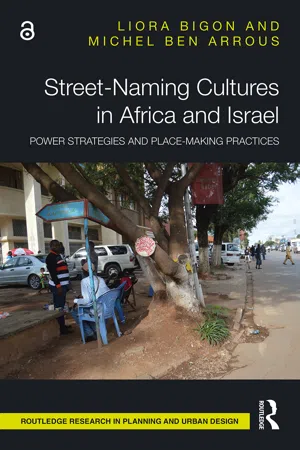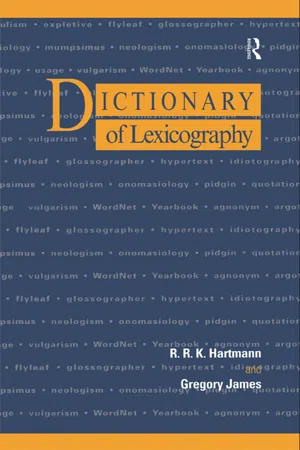Eponyms
Eponyms are words that are derived from the name of a person, often the person who first discovered or popularized the concept associated with the word. These terms can be found in various languages and are used to honor or acknowledge the individual's contribution to the field. Eponyms are prevalent in fields such as medicine, science, and technology.
3 Key excerpts on "Eponyms"
- eBook - ePub
Improve Your Word Power
A concise way to increase your word power
- Clifford Sawhney(Author)
- 2018(Publication Date)
- V&S Publishers(Publisher)
...Eponyms or Name Words Wittingly or unwittingly, some people (or places) have left their names for posterity through words that were coined after them. Called Eponyms, these words tell interesting tales about their origins. Eponyms are derived from the names of real, fictional, mythical or spurious persons, places or characters, although many Eponyms come from a person’s surname. Aphrodisiac N. Food, drink or drug that stimulates sexual desire. Aphrodite was the Greek goddess of love and beauty. Armageddon N. 1. The last battle between good and evil before the Day of Judgement (as mentioned in the New Testament). 2. A catastrophic conflict. The word is derived from the Hebrew, Har Megiddon or Hill of Megiddo. The word now means a fnal, decisive confict. **** Bayonet N. A long blade or dagger fixed to the muzzle of a rife for use in hand-to-hand fighting. Bayonne, a town in south-west France, has been immortalised with the word bayonet, where these long daggers were first made. Bloomers N. 1. Historical. Women’s loose-ftting trousers, gathered at the knee or ankle. 2. Women’s loose-ftting knee-length knickers. In 1849, Mrs Elizabeth Smith Miller invented a working model of a garment and showed them to famous women’s rights activist, Amelia Jenks Bloomer. The garment was both modest (they then reached down to the ankles) and convenient. Mrs Bloomer loved the garment and promptly sponsored it… and the word bloomers soon saw the light of day. Bobbitt V. To forcibly cut off the male organ or penis. In the 1990s, an American housewife, Lorena Bobbitt, was fed up of her husband’s never-ending affairs. When umpteen warnings failed to have the desired results, in a fit of anger one night, Lorena Bobbitt simply lopped off her husband’s penis while he was sleeping. Bowdlerize V. Remove from (a text) material that is regarded as improper, offensive or politically incorrect. In 1818, an English editor Dr Thomas Bowdler published an expurgated edition of The Family Shakespeare...
- eBook - ePub
Street-Naming Cultures in Africa and Israel
Power Strategies and Place-Making Practices
- Liora Bigon, Michel Ben Arrous(Authors)
- 2021(Publication Date)
- Routledge(Publisher)
...European or African names, endogenous or exogenous). A clearer qualitative difference lies in the multidisciplinary dimension of critical toponymy (mainly involving geographers, historians, linguists and political scientists) and broad theoretical engagement. We retain the conventional distinction between two ‘ages’ of place-name studies while still noting that some important studies such as Topalov’s seminal work on the ‘words of the city’ (2002a) do not fall under any of them. 2 We borrow the notion of halo from Roland Barthes, whose Mythologies (1957, 218) interpreted mundane elements of mass culture, or “myths”, as full of situated meanings: “Around any final meaning, there always remains a halo of virtualities where other possible meanings are floating: the meaning can almost constantly be interpreted” (emphasis in the original, our translation). Lisa Radding and John Western note that it is when toponyms become “opaque” (i.e. when people fail to remember the specific connotations that those giving place-names originally sought to emphasise) that they become “more closely tied to the cultures that use them because it is culture that in turn gives a name meaning” (2010, 410). This remarkably applies to many of the postcolonial situations we examine, where colonial street names persist but the initial connotations for which each was specifically chosen were lost over time and new meanings emerge from the fabric of societal connections. In this respect, the “almost constant” reinterpretation of century-old toponyms is no less productive of innovative meanings than the much more studied processes of renaming and creation of neo-toponyms or new names. 3 The politics of place naming in post-apartheid South Africa is unique in many respects. Toponymic change has been initiated at all scales: street, suburb, city, municipality, village, district, province, national features and monuments. Names are allowed in the 11 languages recognised by the constitution...
- eBook - ePub
- R. R. K. Hartmann, Gregory James(Authors)
- 2002(Publication Date)
- Routledge(Publisher)
...N name A word or phrase used to designate a specific person, place, organisation, artistic creation or object. In English and in many other languages this is done by using capitalised words (e.g. Abraham Lincoln, Hong Kong, British Broadcasting Corporation [the BBC], Gone with the Wind, Mazda). Names (often called ‘proper nouns’ or ‘proper names’) are part of a language’s cultural vocabulary, but many dictionaries do not provide this ONOMASTIC INFORMATION. APTRONYM, EPONYM, ETHNONYM, FORM OFADDRESS, NICKNAME, ONOMASTICS, PERSONAL NAME, PSEUDONYM, TOPONYM, TRADE NAME. national A centrally Mufwene 1988, Rader 1989, ISO 1990, McArthur 1992, Svensén 1993, Urdang 1996. A Collector’s Compendium of Rare and Unusual, Bold and Beautiful, Odd and Whimsical Names (P.Dickson), New York NY, 1986. name dictionary ONOMASTIC DICTIONARY. name lexicography ONOMASTIC LEXICOGRAPHY. naming principle A set of standards for the creation and standardisation of names in the terminologies of technical fields. NOMENCLATURE. narrow transcription TRANSCRIPTION. national archive A public collection of records and government documents. national dictionary A cultural or historical dictionary of significance to the official language of a country, often financed by central government or an ACADEMY and compiled by a team of scholarly lexicographers. ACADEMY DICTIONARY. national language A language used de facto for everyday purposes in a country or territory, e.g. English in Ireland. OFFICIAL LANGUAGE. national library A library of major significance to a country, often centrally funded and located in the capital city, such as the Bibliothèque nationale in Paris, or the Library of Congress in Washington DC. DEPOSITORY LIBRARY. native language A language acquired in early childhood, often called ‘first language’ or ‘mother tongue’, in contrast to a language learned later, either as a SECOND LANGUAGE or as a FOREIGN LANGUAGE...


